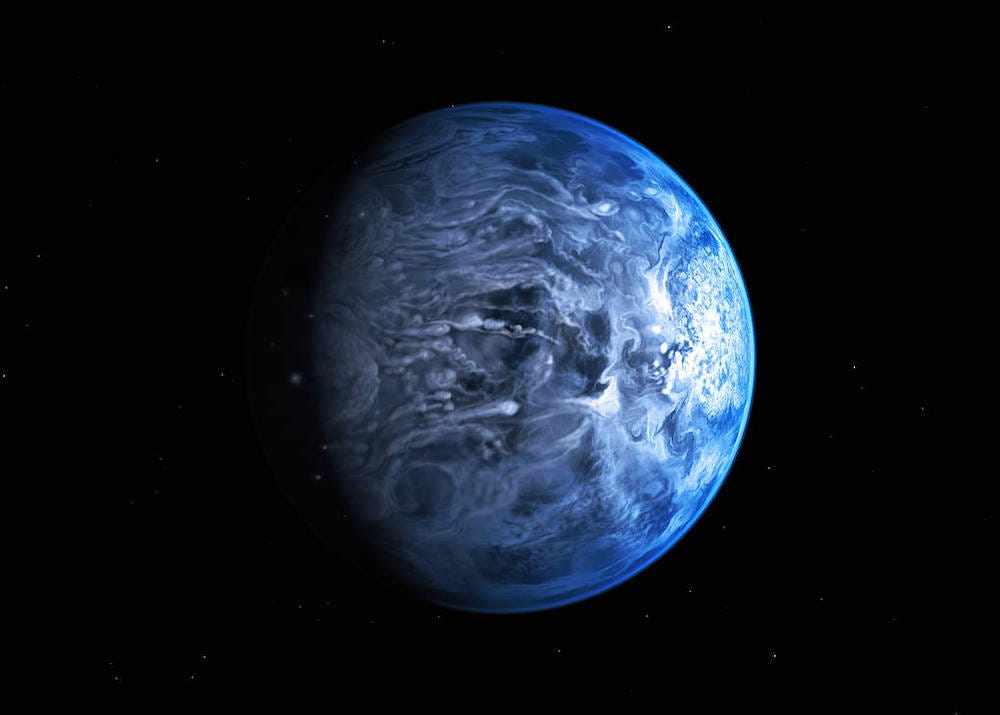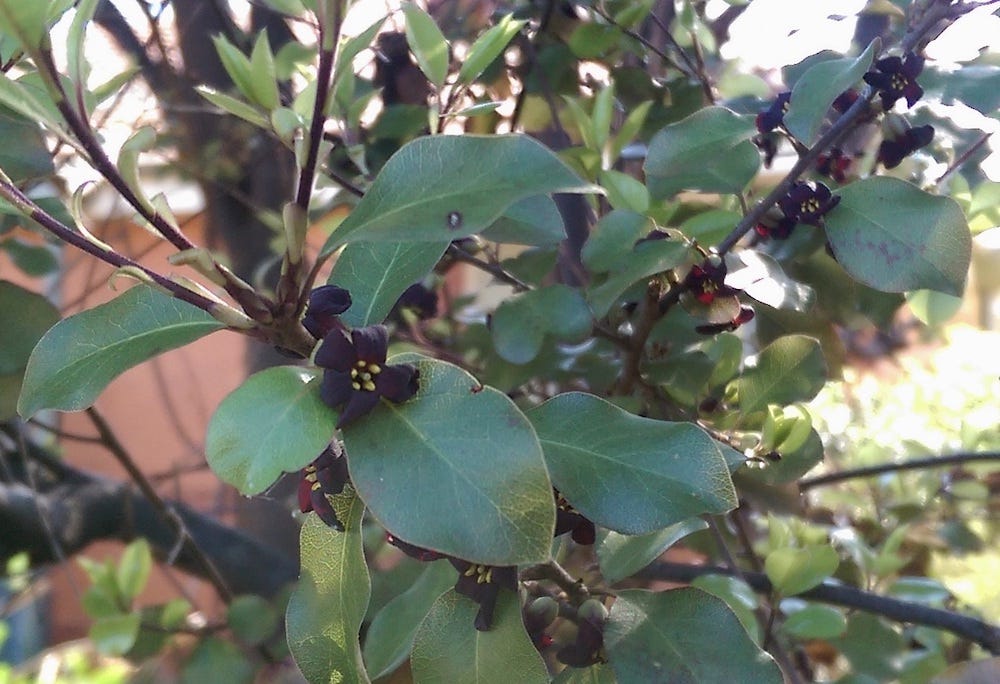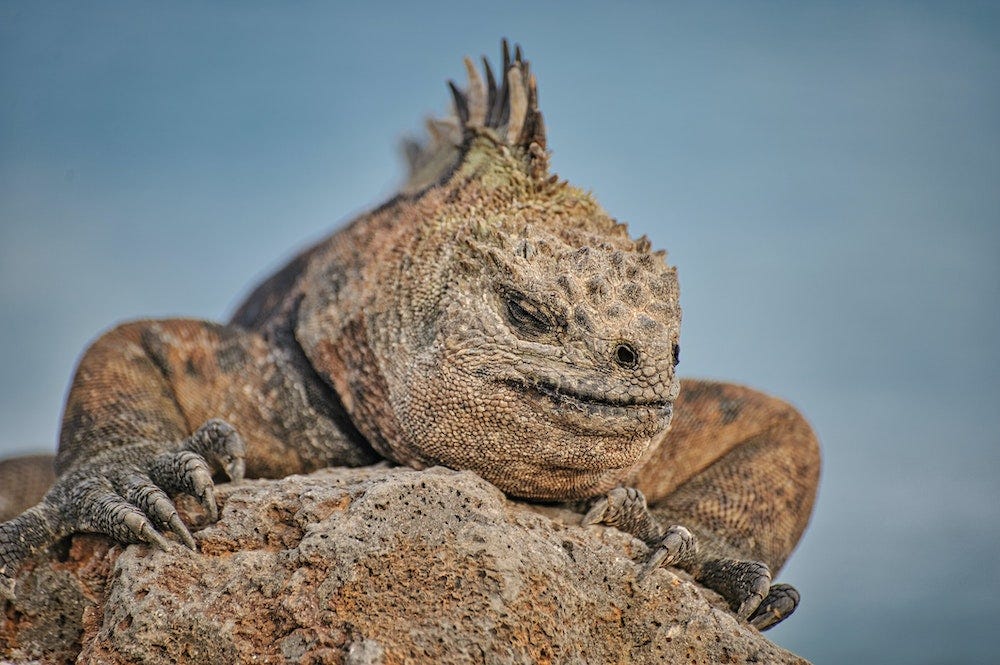The hot Jupiter of surrealism
№ 9 | 31 December 2021
Poetry is its own truth – it cannot tell the truth as science, law, philosophy or ideology see it. Nor is it little more than a mouthpiece for a foundational self. ⁂
Exoplanet HD 189733 b – photo ESO/M. Kornmesser
Kōhūhū
I love how my country feels like morning
all the time. No matter how well sport
or the economy are performing,
nothing matches how well it has caught
the dawn, and let the black matipo slip
the scent of night, as soon as day brought
definition to the canopy – rip
tide into daylong nocturne of shade.
Our Eurydice tree is not equipped
to withstand the sun, but is degraded
to a shrub and to the myth of some
other land that eludes sense, to be displayed
for inquisition. Our whole project dumbs
down for the day but wises up at night
for the stars’ and the moths’ consummate wisdom,
but I never saw those flies at first light.
They were always gone by the time I paused
by the traffic. Once I smelt the scent’s flight,
to catch its death’s bare instant of remorse.
¤ Woodford Halse, UK, 27 December 2021
poetry ... polis ... what do you think?
A tree, surrealism, and a ‘hot Jupiter’
In this newsletter, you will find a poem about the black matipo tree of Aotearoa New Zealand, one on an obscure Uruguayan poet and a famous New Zealand sexologist, and lastly a poem about an exoplanet.
What is the connection between a tree, surrealism and a ‘hot Jupiter’?
Maybe the same sort of connection we find in the second poem when Lautréamont juxtaposed an umbrella and a sewing machine on a dissecting table, and Man Ray made an installation out of that combination.
Poetry has to work with the truth as poetry finds it, not as ideology or critique would prescribe it, and not as science, law or philosophy would require of it. Poetry is also not to be confined by the ego and limitations of the poet. We all have limits but the poet must not preclude poetry’s possibility of finding itself, in spite of her or himself.
The self that insists it is foundational is a fiction or cultural construct. There are ways out of that naivety.
The kōhūhū, or black matipo, is a plant with an elusive secret. Fragrant all night long from its small black fleurs du mal, it attracts the moths and night flies. As soon as light falls on it, though, the scent vanishes. At about seven in the morning in the Spring of 2016, I would stand next to a bush on the northeast corner of Clyde Street and Wairere Drive, in Hamilton, and wait for the fragrance to disappear.
Kōhūhū or black matipo – photo Tim Entwistle
This brought to mind the myth of when Orpheus turned back towards Eurydice as they were about to leave the underworld, and how she was again lost to him. Poetry is that elusive, and for most of us it uses one of our least developed senses. It takes practice to use it.
Poetry is a process of elimination and wising up. Dumbing down is bad if we iconoclastically throw the sink and the whole bathroom out the window. There is no point denying that we belong to a wider civilisation, that we have contact with other civilisations, and that our language has its own memory and encoding.
Yet we do have to strim, cut back and arrive at the radical truth of what is being said.
The root of poetry is listening. It takes practice to hear the poem rightly. We have to be wise to the tricks that language plays, or else it will predetermine us through a turn of phrase, some narrative, or discourse. Language is great at putting up scaffolding and filling in gaps in all the wrong ways.
Poetry is the recovery of freedom within language. I’ve heard tell of contemporary authors and poets who never read past authors. This is naive. We are the sum of our readings and auditions, the sum of le silence de l’écriture, as the French call it, pairing Denken und Dichten, two of Heidegger’s buzzwords that we saw in a previous newsletter. ⁂
Creative Dharma, a newsletter is another Tuwhiri Project initiative
Lautréamont
In memory of Dr John Money (1921–2006)
Male adolescence was rediscovered
in 1860s France. Dostoyevsky
also rescued it from the cupboard
of Latin and Greek. The flaneur’s frenzies
were from the future sewn in his jacket –
not one of badminton and jetskiing.
Dr Money opened Man Ray’s packet
and laid out the umbrella and sewing
machine of the deceased. Prophylactic
ulsters and onanistic knowing
had needlepointed love’s jammed shuttlecock,
before ludicrous evil went stowing
the lad away, mon petit chou knocking
repeatedly on an iron bridge, drowned –
dauphin about town. Such freight comes to dock
and proves how unspeakably these boys clown
round. You, John, on your dressing-room table
dissected a war generation’s wound
up thread, unpicked the surrealist labels.
¤ Woodford Halse, UK, 25 December 2021
Flying on manual, switching the autopilot of language off
Writing poetry requires that we fly on manual and switch off the autopilot of language. The surrealists, led by André Breton, interposed scandalous associations that seemed dissociative to the post-first world war public and readerships.
The true name of the Uruguayan poet, Lautréamont, was Isidore Ducasse (1846–70). He died during the Siege of Paris, a young man of letters starting his career. His Les Chants de Maldoror professed to be a study of evil, which he would then follow up with a study of goodness. He got as far as the evil bit, which was rediscovered in a Parisian bookshop in 1917, and was one of those French poets like François Villon who vanish without a trace, for the next generation to find again.
Anyhow, he compared a character called Mervyn to an umbrella and a sewing machine on a dissection table. Maldoror killed him, bagging the adolescent and knocking his head against a bridge before throwing him, bagged, into the river. The murderer was minded to demonstrate evil by what we would call online grooming. Man Ray made an installation of this, of the sewing machine, and one assumes also the umbrella done up. Breton and Dali were excited by this.
I had the privilege of knowing Dr John Money (1921-2006) through the project to repatriate his art collection to the Gore, where it can be found in the Eastern Southland Gallery. Aotearoa New Zealand is a country that throws up Leonardesque geniuses like John, Len Lye, and the psychiatrist Edwin Keith McLeod, which it does not know what to do with.
As many farmers know, certain soils have a runoff problem. It is easier to have a long white cloud of what is comprehensible and reassuring, but the world is not like that any more. New Zealand is cut off by COVID, and it is beholden on us to make the effort to understand what is going on.
Volatile times require versatile minds, not ideological path dependency or a kind of scholasticism.
I have John’s books around me now, which he inscribed and gave me as gifts. The gift of such people to Aotearoa New Zealand is that they are not ‘The Man Who Knows’. Ours is a country which 19th century positivism never left. It became a mental habit.
The opt-out from a purely empirical and technical place was some lodge, secret society, some hermeticism, imparted in a circle of close associates. ‘The Man Who Knows’ was a kind of spiritual director. Poetry had this, too. But there is no such person, and there should be no such role.
We have to make up our minds for ourselves, and take responsibility. That involves accepting that the world is not as we thought it was, and that our true guides are fellow travellers and fellow questioners who may know how to ask the right questions, rather than who impart absolute truth.
Dr Money was in the business of dealing with ‘unspeakable monsters of the mind’. Maldoror was one such imaginary creation. Poetry confronts such monsters, and at the end of my book, Crete 1941, we are left with the thought that maybe poetry itself was the monster all along – a poetics of politics and state violence.
Bearded dragon, Galapagos Islands – photo Alexander Schimmeck (Unsplash)
John was of the same generation as the French philosopher Michel Henry (1922-2002). To agree with Henry is like placing the sewing machine beside John’s umbrella. How radical can one be? His doctoral thesis was examined by Wahl, Hippolyte, Alquié, Gouhier and Ricoeur – the educators of Derrida, Bourdieu, Foucault (and Macron!) – and pronounced outstanding and impressive for its rigour. He refused the limelight and taught quietly at Montpellier.
What was his secret?
At 22 years of age Henry was in the French resistance, the maquis, in the Jura mountains. Lyon was where he operated, and Klaus Barblie placed a price on his head. Henry was the real life Ashes and Diamonds, as in the 1958 Polish film by Andrzej Wajda, or Flame and Citron, the 2008 Danish film by Ole Christian Madsen. Except that he lived unlike those resistance assassins, and wrote an entire philosophical oeuvre influenced by such monstrosity of the mind. Certainly of the Germans. Maybe he confronted something in himself as well.
His last work, which he did not complete, he titled Le livre des morts, or The Book of the Dead, a study of the clandestinity he experienced in youth. Anonymity is a characteristic of young adults before their elders, and younger people. Clandestinity is something else again.
I distill some of his thinking into the poem that follows, on the exoplanet HD 189733 b, which is in the Vulpecula constellation 64.5 light years from us. The bit about it raining iron is from a controversy about another hot Jupiter in Pisces known as Wasp 76b.
We do not really know where we are in such a poem – what is outside is inside and vice versa, radical immanence is opposed to the ekstases of the phenomenology of Husserl, of Heidegger, of Gadamer, and of Ricoeur. Not that positivist New Zealanders ever confidently avowed, or identified with, the trails of continental philosophy. ⁂
Behind the scenes...
If you would like advice and teaching on poetics and the composition of epic poetry, write to
If you require a bespoke report with reliable international relations advice write to
HD 189733 b
Go as far as you can inside, where wind
itself is hypersonic and it rains
shreds of glass as iron falls from islands
In the sky; yet by doing so, you gain
on reality, or it gains on you.
For ekstasis is death and this terrain
is only for the objective few.
We should struggle further and get beyond
these zones where the myriad crew
of failed intelligences respond
with blasphemous worlds of pitiless
being. Biological life fondled
and fed, is impossible to witness.
Something more than cause is meant – essence
that demands force from those who are fittest
to resist; or acceptance of presence
that is not singularity. Figures
we do not know, are felt as immanence.
Lose yourself within their joys and rigour.
¤ Woodford Halse, UK, 28 December 2021
The next poetry & polis will be in your mailbox on 7 January
I shall begin 2022 by asking: ‘Whose country is it?’ – this is an old New Zealandism, if there ever was one. I will also examine the potential for conflict in eastern Europe, the Pacific, and in mountains from the Caucasus to the Himalayas.
Do please tell your friends how much you’re enjoying poetry & polis. Surely surely they will too‽ ⁂





